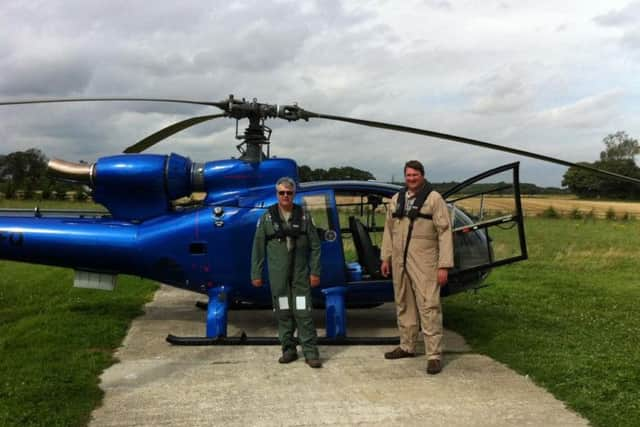Mother's tribute to son who died after suffering 'survivable' injuries in helicopter crash
Nigel Feetham, 36, was operated on for spinal injuries at Leeds General Infirmary (LGI) following the crash at Breighton Aerodrome, near Howden.
But he died six days later from a pulmonary embolism caused by a blood clot in his leg and neck on July 25 2016.
Advertisement
Hide AdAdvertisement
Hide AdMoments before the crash he carried out a routine manoeuvre, called a “quick stop” which sees an aircraft rapidly decelerate in the air.


But as it levelled out, the rotor blades hit the tail boom, causing catastrophic damage.
The Alouette helicopter with four passengers on board span 180 degrees and plunged around 15ft to the ground.
The care given at LGI was put under the spotlight at an inquest in Hull, after family and friends raised concerns about his treatment, including an overnight stretch when he went without pain relief and discovering that equipment aimed at cutting the risk of clots was not always switched on.
Advertisement
Hide AdAdvertisement
Hide AdHis mother Vivian Feetham, from Hedon, said her son “enjoyed every minute” of flying, adding: “It opened up the doors to the world.”


Mr Feetham, who grew up in Burton Pidsea and went to South Holderness School, told the local Holderness Gazette when he was just eight that he wanted to fly helicopters.
He started training at 19, gained his licence at 21, and went on to clock up nearly 800 hours of flying.
It was a passion that took him to countries including Poland and Russia, where he competed as part of the British team in the World Helicopter Championship.
Advertisement
Hide AdAdvertisement
Hide AdThe inquest in Hull heard that on one occasion a doctor on his ward round discovered that the inflatable cuffs, called flowtrons, which squeeze the legs, were not on.
Another time they were not plugged in after the ward underwent a deep clean while on another a visitor had to plug them back in.
Patients also sometimes take them off because they can be uncomfortable.
Dr Nigel Gummerson, consultant orthopaedic spinal surgeon, accepted there were “some gaps when things were maybe switched off”.
Advertisement
Hide AdAdvertisement
Hide AdBut he said even if they had been on all the time, there was still a risk of clots forming.
Professor Christopher Lavy, who was called in to give an independent opinion, found no evidence of clinical negligence.
Asked by assistant coroner Lorraine Harris whether sticking exactly to National Institute for Care Excellence guidelines could prevent a pulmonary embolism, a blocked blood vessel in the lungs, from occurring, Prof Lavy replied that there was “absolutely no guarantee".
He added: “We wish we could do something to prevent it.”
Since Mr Feetham’s death there has been changes at LGI, including nurses having to check three times a day that the devices are working.
The trust also now has a thrombosis steering group.
Advertisement
Hide AdAdvertisement
Hide AdMrs Feetham said: “I feel they have improved the systems at the hospital for monitoring the use of the flowtrons. I am pleased they have done that for the benefit of anyone else going through this.”
Friend Steve Atherton said the Air Accident Investigations Branch report had not found any pilot error following the 2016 crash.
He added: “I flew with Nigel many times, he was an exceptionally talented pilot.
"I've flown with him all over the world and we had some great times."